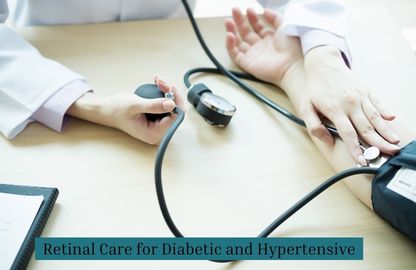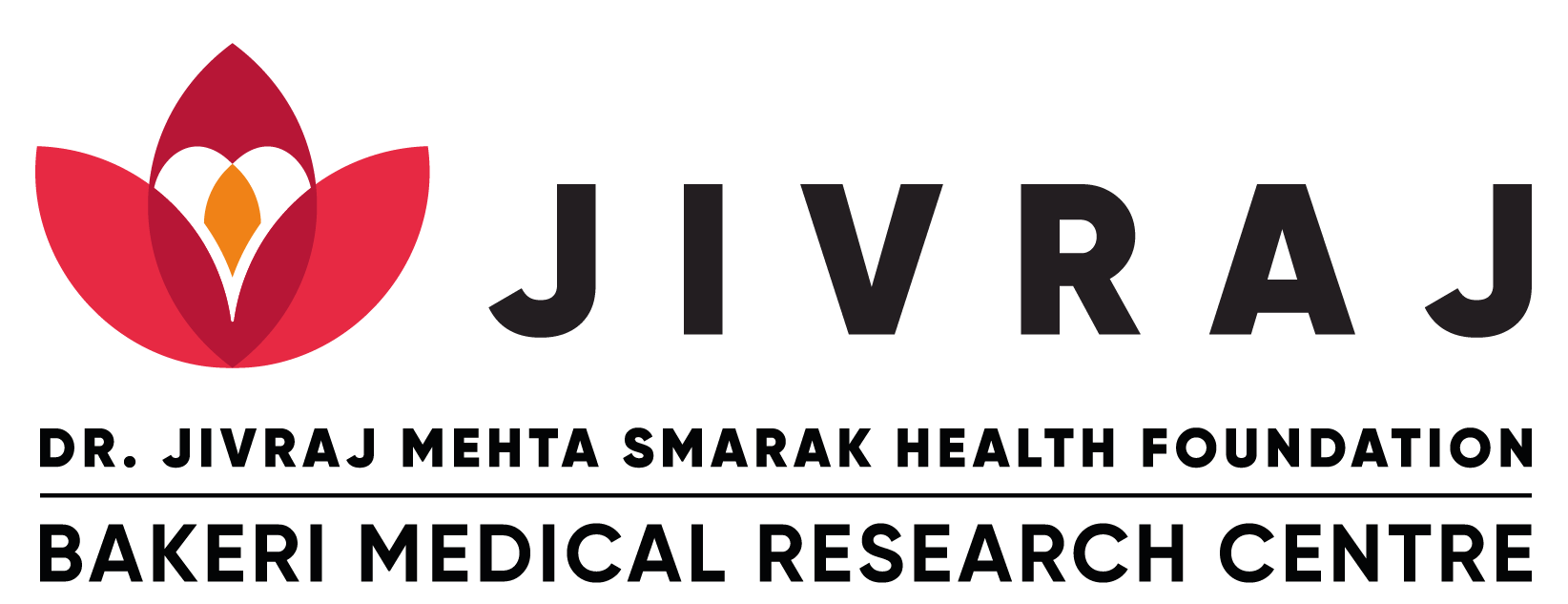Retinal Care and Vision Management for Diabetic & Hypertensive Patients
The retina is one of the most sensitive and vital structures in the human eye, responsible for converting light into neural signals that enable vision. For individuals with diabetes or hypertension, retinal health requires constant monitoring because these systemic conditions directly affect ocular blood vessels. Poorly managed diabetes may lead to diabetic retinopathy, while uncontrolled hypertension can result in hypertensive retinopathy. Both conditions may progress silently, often without symptoms until advanced stages. In Ahmedabad, access to specialized ophthalmology care ensures that at-risk patients receive timely diagnosis, effective treatments and preventive strategies to preserve vision.
Why Is Retinal Care Essential for Diabetic and Hypertensive Patients?

Systemic diseases like diabetes and hypertension exert a direct impact on the microvascular system, including the delicate retinal vessels. Elevated blood sugar damages small vessels in the retina, causing leakage, swelling and ischemia – collectively known as diabetic retinopathy. Similarly, persistent high blood pressure leads to narrowing, thickening or rupturing of retinal vessels, producing hypertensive retinopathy.
The major risk lies in their silent progression. Many patients may not notice vision disturbances until irreversible damage has occurred. Regular consultations with an ophthalmology specialist in Ahmedabad allow early detection through retinal imaging and timely interventions. These measures help prevent complications such as macular edema, retinal vein occlusion and even vision-threatening conditions like retinal detachment.
How Does Diabetes Affect Retinal Health?
Ophthalmologists in Ahmedabad emphasize that high blood sugar levels accelerate vascular damage and compromise oxygen delivery to retinal tissues. Patients with long-standing or uncontrolled diabetes may also develop diabetic macular edema, a condition where fluid accumulates in the macula, leading to central vision impairment.
Through advanced ophthalmology care in Ahmedabad, specialists employ diagnostic tools like fluorescein angiography and fundus photography. These techniques detect early microvascular changes, allowing interventions such as laser photocoagulation, intravitreal injections or anti-VEGF therapy to preserve vision.
What Role Does Hypertension Play in Retinal Damage?
Hypertension alters the structure of retinal arterioles, causing narrowing, hemorrhages and in severe cases, swelling of the optic nerve. Known as hypertensive retinopathy, this condition may be asymptomatic until sudden vision changes occur.
An ophthalmology specialist near patients in Ahmedabad can detect early retinal changes such as arteriovenous crossing abnormalities, cotton wool spots and retinal hemorrhages. These findings are not just ocular signs – they may also indicate systemic cardiovascular risk.
Best ophthalmologists in Ahmedabad stress that regular eye examinations are vital for hypertensive individuals, especially those with long-standing or poorly controlled blood pressure. Preventive care and early interventions reduce the risk of vision loss while also guiding patients toward better systemic disease management.
What Are the Common Symptoms That Indicate Retinal Issues?
While early stages of diabetic and hypertensive retinopathy often progress without symptoms, patients may notice certain warning signs such as:
- Blurred or fluctuating vision
- Sudden vision loss or dark spots
- Difficulty seeing at night
- Distorted or patchy visual fields
- Frequent changes in prescription glasses
If such symptoms arise, consulting an ophthalmology specialist in Ahmedabad becomes urgent. Advanced diagnostic methods can confirm whether the issue is linked to diabetes, hypertension or another retinal disorder, ensuring that treatment begins before irreversible damage sets in.
How Is Ophthalmology Diagnosis Conducted for Retinal Diseases?
Diagnosis of retinal conditions in diabetic and hypertensive patients relies on advanced ophthalmology tools that visualize retinal structures with high precision. Common diagnostic methods include:
- Fundus Examination: Direct or indirect ophthalmoscopy to assess retinal vessels and optic disc.
- Optical Coherence Tomography (OCT): High-resolution cross-sectional imaging for detecting macular edema or thinning.
- Fluorescein Angiography: Dye-assisted imaging to identify leakage, ischemia or abnormal vessel growth.
- OCT Angiography (OCTA): A non-invasive technique that maps retinal blood flow.
Ophthalmology care in Ahmedabad ensures that such diagnostic methods are integrated into routine check-ups for at-risk patients. Regular screening every 6-12 months is strongly advised for those with diabetes or hypertension.
Testimonial
“Dr.jivraj mehta hospital have a very professional and takes good care of patient. He explained me thoroughly the problem and solution.I would highly recommend everyone those who have a plan for any kind of body check up to Dr.jivraj mehata hospital.Thank you doctor and staff for taking good care.”
What Ophthalmology Treatments Are Available for Retinal Disorders?
Treatment depends on the stage and severity of retinal involvement. An ophthalmology specialist in Ahmedabad may recommend:
- Laser Photocoagulation: To seal leaking vessels and prevent further damage in diabetic retinopathy.
- Intravitreal Injections: Anti-VEGF agents or steroids to reduce macular edema and control abnormal blood vessel growth.
- Systemic Disease Control: Coordination with physicians to regulate blood sugar and blood pressure levels.
Best ophthalmologists in Ahmedabad emphasize that controlling systemic factors is as important as local ocular treatment. Without stable glucose and pressure levels, retinal therapies may only provide temporary relief.
How Can Patients Prevent Vision Loss Through Ophthalmology Care?
Prevention remains the cornerstone of ophthalmology treatment in diabetic and hypertensive patients. Steps include:
- Regular ophthalmology visits every 6-12 months
- Strict management of diabetes and hypertension
- Lifestyle modifications including diet, exercise and reduced stress
- Immediate consultation when vision changes occur
- Avoiding self-medication or delay in seeking care
Ophthalmology specialists in Ahmedabad advise patients to prioritize annual eye exams as part of their systemic disease management. This proactive approach ensures that retinal damage is detected at its earliest, most treatable stage.
Why Should Patients Seek an Ophthalmology Specialist in Ahmedabad for Retinal Care?
Ahmedabad has emerged as a hub for advanced ophthalmology care, offering modern diagnostic and treatment facilities led by experienced specialists. Patients benefit from personalized management plans that integrate both ocular and systemic health considerations.
Best ophthalmologists in Ahmedabad are skilled in detecting subtle retinal changes that may otherwise be missed, ensuring timely intervention. Whether it is routine monitoring, surgical management or rehabilitation strategies for low vision, seeking care locally ensures access to comprehensive services.
Conclusion
For diabetic and hypertensive patients, protecting vision requires more than systemic disease control – it demands vigilant ophthalmology care focused on retinal health. In Ahmedabad, ophthalmology specialists combine advanced diagnostics, evidence-based treatments and preventive strategies to preserve sight and improve quality of life. Retinal care and vision management are not optional for patients living with diabetes or hypertension – they are essential for preventing irreversible blindness.
FAQs about Ophthalmology Treatment
How often should diabetic patients visit an ophthalmology specialist in Ahmedabad?
They should schedule an eye exam at least once a year or more frequently if retinal changes are detected.
Can hypertension alone cause vision problems?
Yes, uncontrolled hypertension can damage retinal blood vessels and lead to hypertensive retinopathy.
What treatments are available for diabetic retinopathy in Ahmedabad?
Laser therapy, intravitreal injections and vitrectomy are commonly used depending on disease severity.
Are retinal issues always symptomatic in the early stages?
No, diabetic and hypertensive retinopathy may progress silently, making regular screening essential.
Can lifestyle changes improve retinal health for diabetic and hypertensive patients?
Yes, controlling blood sugar, blood pressure and following a healthy lifestyle may slow disease progression.






